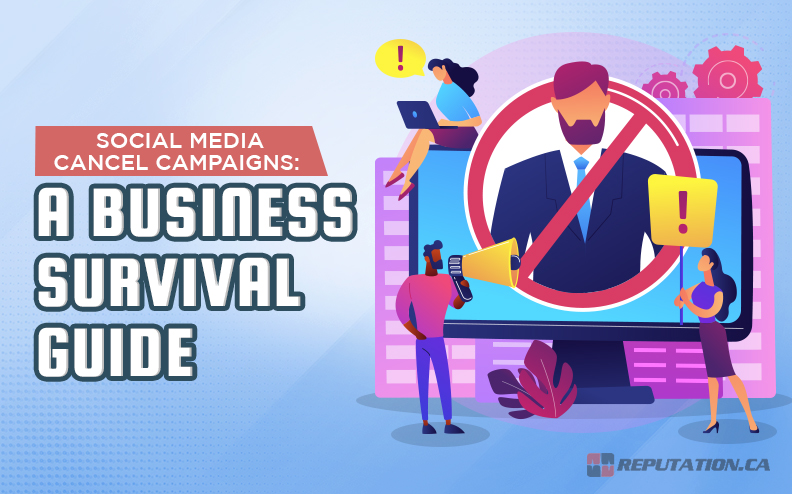Do you know what a “social media cancel campaign” is? Likely, if you use sites like Twitter or Instagram, then you’ve seen a “social media cancel campaign.” It’s like seeing a wildfire on the internet, burning without control and damaging reputations and brands.
This is how people shame others in this age of technology – it’s fast, harsh, and spreads everywhere. But what starts these campaigns? How do they grow so fast?
And maybe the most crucial point for businesses nowadays: what’s the best way to react if your company is targeted? What steps can turn this situation around or even help you come out better?
We’re going to discuss the cancel culture trend on social media sites and try to answer all these pressing questions (yes, pun intended). So, pick up your fire extinguisher; we’re about to dive into the heat together!”
You see, it’s not as complex as it may seem at first. Mind you, it’s still a serious issue and needs careful navigation. Keep that in mind. Are you ready? Well, let’s get into it!
Social media “cancel” campaigns are like a sudden digital storm that can take any business by surprise. They show the combined power of social media users to “reject” or avoid businesses and people who’ve done something wrong in their opinion.
These campaigns are usually sparked by things like scandals, and they grow fast because of how quickly things can spread on social sites like Twitter and Facebook. Something small, like one tweet, can become thousands in a few hours.
This has all started because of people online wanting to make others take responsibility for actions seen as hurtful or wrong. However, it’s not always clear-cut. There are often strong discussions about what a fair punishment is and when a person should be “rejected.”
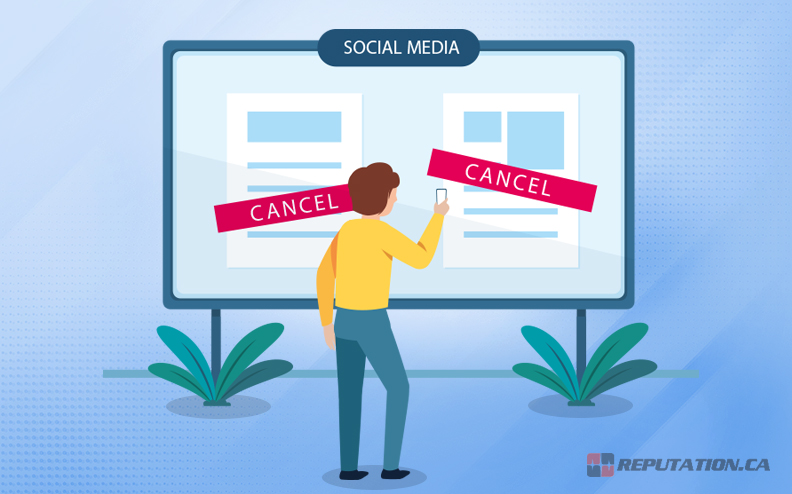
Over the past few years, we’ve seen this happen in a lot of big cases. Big stars have lost deals, and company bosses have had to leave their jobs because people are upset on the internet.
One example you’ve probably heard of is the #DeleteUber campaign. Uber had a lot of people angry at them after it seemed like they were making money during a taxi strike protesting against President Trump’s immigration ban back in 2017. This resulted in a lot of users deleting their Uber app, which cost them a lot.
Now, the thing is, getting “rejected” isn’t always something that lasts forever. By doing the right thing at the right time, even those who’ve been rejected can bounce back – but I’ll get to that a bit later. Public opinion changes: What’s seen as wrong today might not be tomorrow. People on social media are quick to judge but also quick to forget, and new scandals often make people forget about the old ones.
Why does all this matter? You can’t underestimate the impact of these cancel campaigns in a world where we live so much of our lives online. Your online reputation can strongly influence whether your business does well or not. So, it’s super important for organizations to understand what’s going on and be ready to respond to possible criticisms.
Key Factors that Trigger Cancel Campaigns
So, what starts a cancel movement? It usually begins with people thinking something wrong or surprising has happened. Let’s look at these actions that could start a cancel movement more closely.
People using social media are quick to point out things that may look rude or troubling. Companies can’t risk these mistakes because they might start a cancel movement fast. For example, there was a time when Lululemon messed up; they had an art piece in a workshop that people saw as racist.
Users of social media have no patience for shocking things like racism, sexism, teasing, or any kind of bad behavior. This type of acting out is like throwing fuel on a fire for attempts to cancel someone or something.
If what you’re selling doesn’t do what it says it will, get ready for trouble. Customers are not shy about sharing their experiences online – both the good ones and the bad ones. This can lead others to call you out, too.
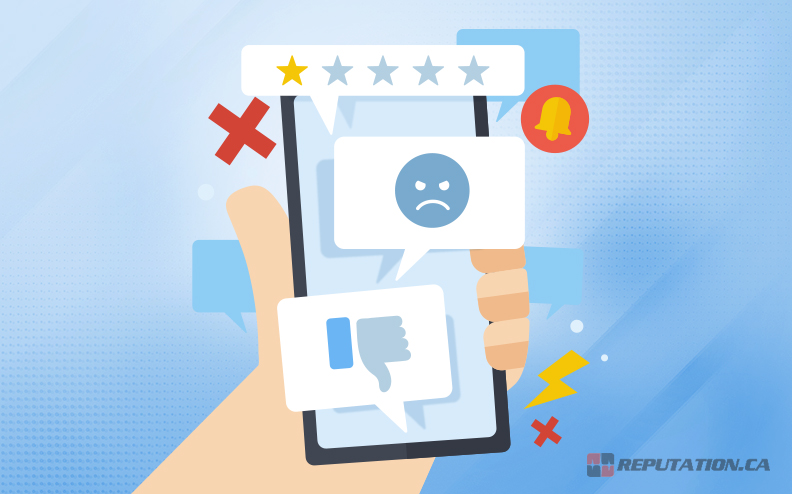
People expect companies to not only have good products but also to be responsible. Any sign that you don’t care about the environment or are treating workers unfairly can lead people online to start a cancel movement against you.
Getting a handle on these fire-starters is one way to protect your company from cancel movements. But just remember, no plan can take the place of real honesty and sticking to what matters to people. You see, it’s pretty straightforward.
Now, let’s talk about another important aspect. Are you ready? If your product doesn’t do what it promises, expect a pushback. Customers won’t think twice before sharing their good and bad experiences online, possibly inviting more folks to join in criticizing you.
The public expects businesses to provide not only top-quality products but also show responsibility towards society. Any hint of harm to the environment or treating workers in an unfair manner can steer people online towards initiating a cancel campaign against you.
Understanding these key factors is one step towards shielding your business from cancel campaigns. Be that as it may, remember that no amount of preparation can replace genuine integrity and a commitment to principles that resonate with the public. Makes sense? So, play fair and be honest. It’s as simple as that.
To start, let’s give some popular examples where businesses or people got a lot of negative attention because of a cancel campaign. Every case helps us understand how strong and wide social media’s influence is.
- The creator of Papa Johns, John Schnatter, said race-related things that weren’t nice. It didn’t take long for people to get mad, asking for a boycott on social media sites. The company’s sales went down around 13%, which shows how quickly how people feel about you can change.
- Then there’s H&M, who got a lot of harsh words for an ad that people saw as racist. Even after they said sorry and took the ad off their website, stores in South Africa still had to close because of the protests the ad caused.
- A social media star, Laura Lee, felt the heat of cancel culture, too, when old tweets came up that people thought were racist. In just a few days, a lot fewer people were following her, which shows that influencers can easily lose favor if public opinion changes.
Looking at these examples, you see how harmful it can be to a person’s or company’s online reputation when they say or do something without thinking it through, especially when social media highlights it. Pretty quick, huh?
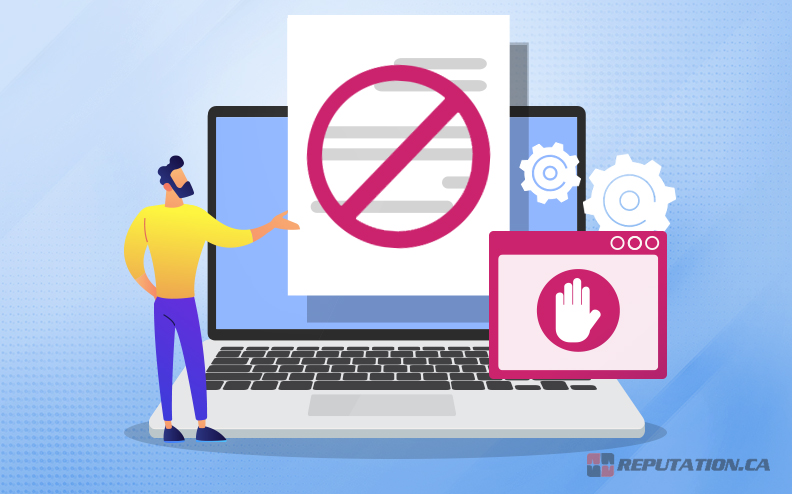
It can be tough sometimes to get a handle on things, especially when it involves safeguarding one’s reputation online. It’s important to be mindful, respectful, and professional in all of our dealings, especially on platforms that have as wide a reach as social media.
Sometimes, it’s quite easy to use social media platforms to drive or escalate cancel campaigns. That may lead to strong public backlash and heavy reputational damage. If you ask me, a little more caution might be needed when we’re posting content on these platforms.
It’s not all gloom and doom, though. There’s always a way to handle these situations. Sure, it can be challenging, but it’s not impossible. In short, being mindful of our online behavior means less risk of regret later.
Who knows? Maybe some of these instances could have turned out differently if the parties involved had taken a little more time to think before posting. In all honesty, with some effort and self-awareness, we can navigate the tricky terrain of online etiquette. So, keep these examples in mind the next time you post something online. After all, why not take a little extra time to ensure we don’t end up as another case of social media failure?
The Role of Public Relations and Crisis Management
Public relations (PR) and managing problems are like lifelines when handling an angry social media crowd. They work just like firefighters, putting out any controversial fires before they harm your brand.
When faced with a hate campaign, PR tactics step in to fix hurt reputations. It’s all about changing the situation, turning bad things into good things. You know, just like turning lemons into lemonade.
Communication, in any trouble, is super important. If you’re dealing with anger online, responding quickly and genuinely can save or ruin your reputation. A well-written message that accepts mistakes and shows you’re fixing things shows responsibility – and that’s something internet users really like.
Teams managing communication during trouble need to be fast but also careful in their responses. “Silence is golden” doesn’t apply here – not saying anything might appear like you’re guilty, and being defensive could fan more anger.

We all mess up sometimes, but what’s important is what you do afterward. Being open about what you’re doing to make things right shows your customers that you’re serious about fixes, be it firing a person who messed up or changing iffy rules – and that can help rebuild trust.
Getting back up after a hate campaign needs you to plan ahead for looking after your long-term reputation – a place where public relations really shine. This guide from HubSpot talks more about handling such situations using PR.
Look at what didn’t work: Use this chance to figure out your weak spots so they won’t happen again in the future. Pretty smart, eh? Make changes to strategies: Change how you communicate and your PR techniques based on what you’ve learned from this. Keep talking: Telling people often about how you’re doing better shows you’re really trying to fix things, not just trying to forget about it. Ultimately, handling an angry social media crowd can be tough. However, good public relations and management strategies can help navigate through these choppy seas successfully.
The Right Way to Respond
When you’re dealing with a big backlash on social media, you need to pay close attention, show understanding, be real, and react quickly. These aren’t just empty words – they’re the building blocks of dealing with a tough situation.
You know, it’s essential to really get why your followers are upset, which means you need to really pay attention, not just hear their complaints. It’s all about getting their feelings and where they’re coming from. Twitter is a pretty handy tool for doing this.
Let’s face it: nobody likes getting a one-size-fits-all reply, especially when they’re really heated – showing that you can relate to their feelings makes them feel like you actually “get” them. A study from the Journal of Consumer Research has shown us just how much customers value businesses that can do this.

If you’ve messed up, just admit it. Trying to deny it happened won’t help you at all. An article from the Harvard Business Review, called “The Authenticity Paradox,” reveals how important it is to be genuine in these types of situations.
In today’s world, where things move in the blink of an eye online, how fast you respond when you’re under fire on social media platforms like Facebook or Instagram matters a whole lot. Why not? When you reply right away, it shows that you’re on top of the situation and eager to clear things up.
Anyhow, delaying your response can make people feel like you don’t care, which might cause you more trouble. Remember, you’re not just talking back to the people leading the charge against you – you’re also reaching out to all your followers. This is a great chance to connect with them on a deeper level and learn something from the experience.
The Wrong Way to Respond
Adding fuel to a social media controversy can be as simple as answering in a defensive or dismissive way. Think of it like keeping a fire burning. And if you delay your reply? Well, you’re just giving the fire more time to grow bigger and bounce back.
Let’s think about it like this. Say you’re on a boat, and it starts to leak water. Would you start arguing about who made the hole, or would you start bailing water out straight away? When things are going downhill fast, acting like it’s not your fault or blaming other people just makes it worse.

You might believe staying quiet will let things settle down on their own. But really, not saying anything often makes people guess what’s going on and spreads gossip, especially on places like Twitter. Taking a quick look at any recent controversial event shows that waiting too long to respond just gives people who don’t like you more time to push their own story without anyone to challenge them.
Doing things on your own to fix problems on social media without anyone to guide you can be risky. Remember that leaking boat we talked about earlier? Wouldn’t it make more sense to get help from an expert sailor instead of trying to deal with rough seas by yourself?
For example, take us at Reputation. We help businesses steer through the problems caused by social media ruckus. Keep this in mind – doing damage control on your own might seem cheaper at first, but it could result in much bigger public relations problems in the long run.
Thinking you’re better than everyone and not caring about valid worries shared by critics makes you seem arrogant and unresponsive. So, reacting too fast without being aware of what the public really thinks can make the problem grow even bigger. Waiting too long to respond might give critics plenty of time to control the story before you get a shot at telling your side. If you respond in an inappropriate way, it can make a bad situation even worse. Just remember this – being real and showing you care can go a long way in dealing with public arguments. It’s a simple thing, but it matters. To put it simply, fast or delayed responses can both create more problems if you don’t handle things carefully.
Moving through a social media uproar, like if something you said or did caused some upset, may feel tough. But you must remember, it’s not the end of the world.
Now, the first thing to do is to admit there’s a problem. This is really important because it shows you’re paying attention and care. Saying sorry and meaning it can often soothe angry people.
Try to understand how the people you’ve upset are feeling. This makes you seem more like an actual person and less like a faceless company. It’s key to do this when you are figuring out how to talk to people as a brand.

The faster you respond to the problem, the better chance you have of fixing the situation before it gets too bad. In these sorts of situations, speed is really important.
When the situation feels too hard to face alone, it’s a good plan to get help from people who understand how to manage problems like these, like us at Reputation. We’re totally ready to help you handle these sorts of issues. Trust me, you don’t have to be a superhero to make it through a negative social media campaign – all you need is fast action, to be real, and perhaps a bit of expert advice.
Have a look at this. The act of people quickly rejecting or “canceling” others online seems to be a trend that’s getting bigger on social media. But, just like anything else, it has its good and bad sides.
On one side, this whole thing lets regular people call out problems they see. Yet, there’s a downside to it. People are so quick to say someone is wrong that they skip over taking a really good look at what’s going on.
Fast forward a bit, and we might see changes in how people join in or respond to these cancellation bandwagons. Perhaps people might become more careful before they join these online movements. They could start to think about why they’re joining in and check that what they’re sharing is right. “Cancel with care” could be a new saying folks adopt.
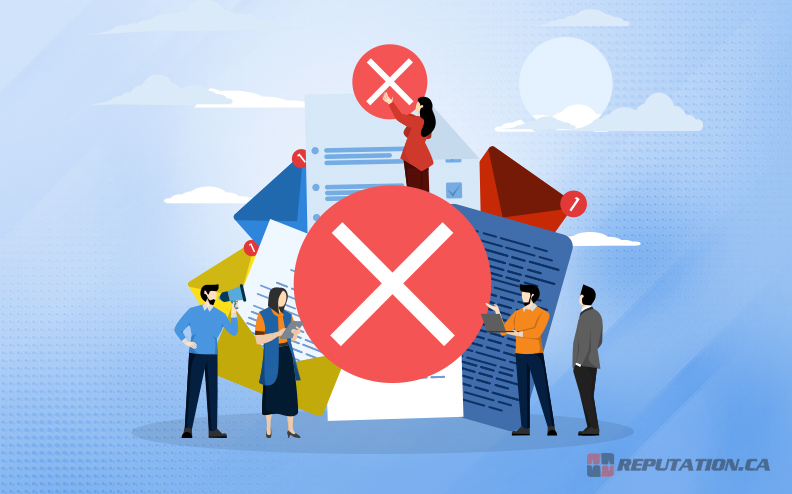
If your business ends up in the middle of an online cancellation wave, don’t worry; you’re not alone. We’re here at Reputation to offer some help.
We’ve got a track record of dealing with problems like this that pop up online. We know what does the job – being understanding and talking to people promptly – but what’s equally important is we know what fails when replying to the scandals that kick off such campaigns. Find out more about how we can guide you through the rough patches.
Well, so the future of cancel culture on social media might be a bit unclear. But, once they’ve got solid plans to manage their reputation and steer the ship carefully, businesses can make it through any rough waters headed their way.
Take Back Your Reputation!
Navigating a social media cancel campaign can be a daunting task, but it’s not too overwhelming. The trigger points, which can ignite these digital wildfires, can leave significant damage to the brand’s image and reputation. On the other hand, understanding effective crisis management techniques and the influential role public relations can play in managing these situations becomes a learning curve.
The right response includes active listening and delivering timely replies imbued with empathy and authenticity. Steering clear of dismissive or defensive attitudes is imperative since these could intensify the situation. Don’t downplay the significant support professional guidance can provide in such testing circumstances.

Within the fast-paced realm of our online society, being on guard against future cancel campaigns on social media platforms is indispensable. After all, even once a storm subsides, it’s possible that another might be gathering strength in the shadows.




